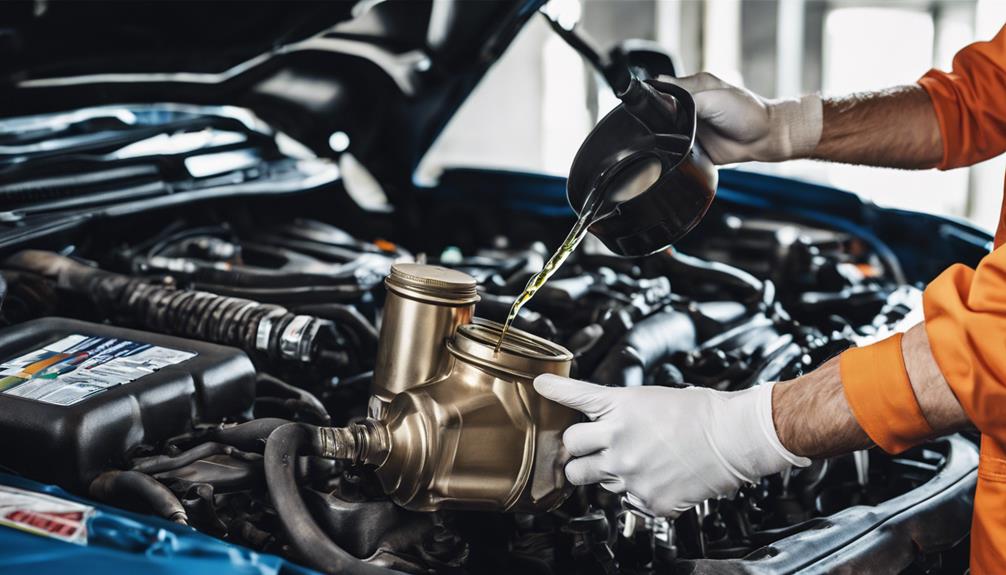Regular oil changes by professionals are essential for maximizing vehicle performance. They guarantee peak engine efficiency, longevity, and safeguard against costly repairs. High-quality oil enhances performance, efficiency, and protects critical components. The quality of oil directly impacts engine operation and durability, making it a key consideration for peak performance. Engine efficiency is boosted, reducing friction, improving fuel efficiency, and preventing overheating. Recognizing signs of needing an oil change, like dark, gritty oil or unusual engine noises, is important for maintaining peak performance and longevity. For more details on choosing the right oil and the benefits of synthetic versus conventional oil, explore further.
Key Takeaways
- Professional oil changes optimize engine performance and longevity.
- High-quality oil enhances efficiency, reduces friction, and protects critical components.
- Regular changes prevent costly repairs and maintain peak performance.
- Adhering to manufacturer guidelines is crucial for optimal vehicle operation.
- Prioritize oil quality for better fuel efficiency and overall vehicle performance.
Importance of Regular Oil Changes
Regular oil changes are undeniably essential for maintaining peak engine performance and prolonging the longevity of a vehicle's drivetrain system. The oil change frequency, typically recommended every 3,000 to 5,000 miles, is vital for top-notch engine health and performance, especially for off-roading or towing activities. While DIY oil changes may seem cost-effective, they come with inherent risks such as improper maintenance and missed underlying problems that professionals are trained to detect early. By adhering to manufacturer guidelines and seeking professional oil change services, drivers can guarantee the longevity of their vehicles, peak performance, and potential savings in the long run by preventing costly repairs due to neglected maintenance.
Benefits of Using High-Quality Oil
Utilizing high-quality oil in a vehicle's engine provides numerous advantages that enhance performance, efficiency, and longevity. High-quality oil, with advanced oil filtration capabilities, helps maintain engine cleanliness by trapping harmful contaminants and preventing sludge buildup. The lubrication technology present in high-quality oil reduces friction between moving parts, ensuring smooth operation and peak engine performance. This superior lubrication not only protects critical engine components but also enhances fuel efficiency and extends the engine's lifespan. Additionally, high-quality oil offers better protection against wear, corrosion, and oxidation, ultimately leading to fewer maintenance issues, reduced repair costs, and improved overall performance in challenging driving conditions.
Oil Quality Matters

The quality of oil utilized in a vehicle greatly impacts engine performance and longevity, making it essential to prioritize oil quality for best operation. Oil filtration and viscosity recommendations play a vital role in maintaining engine cleanliness, preventing sludge buildup, and ensuring ideal lubrication in diverse conditions. Additives in high-quality oils offer enhanced protection against wear, corrosion, and oxidation. A higher viscosity index provides superior lubrication, reducing friction and enhancing engine performance. By investing in quality oil, vehicle owners can expect fewer maintenance issues, reduced repair costs, and overall improved performance.
| Oil Quality Factors | Impact on Engine Performance |
|---|---|
| Oil Filtration | Prevents sludge buildup and maintains engine cleanliness |
| Viscosity Recommendations | Ensures ideal lubrication in diverse conditions |
Engine Performance Boost
Improving engine performance through the use of high-quality oil is essential for ensuring ideal lubrication and reducing friction. High-quality oil plays an important role in enhancing engine efficiency and overall performance. By reducing friction within the engine, high-quality oil provides better protection for critical components, leading to improved fuel efficiency and preventing overheating issues. The proper lubrication offered by high-quality oil ensures consistent performance, especially in challenging terrains where engine stress is heightened. Performance enhancement through the use of high-quality oil is crucial for maintaining engine longevity and efficiency, making it a key factor in optimizing overall vehicle performance. Choosing the right oil with the appropriate viscosity grade and additives is paramount for achieving peak engine performance and protection.
Signs Your Vehicle Needs an Oil Change

Monitoring engine oil condition is essential for identifying when your vehicle requires an oil change. Keeping an eye on certain indicators can help maintain engine health and guarantee peak performance and vehicle longevity. Here are some signs your vehicle needs an oil change:
- Dark, gritty oil signifies the need for an oil change to maintain peak performance.
- Unusual engine noises or decreased fuel efficiency are indicators that it's time for a change.
- Neglecting oil changes can lead to engine damage, reduced performance, and costly repairs, affecting both performance maintenance and vehicle longevity.
Choosing the Right Oil
Selecting the appropriate oil for your vehicle involves considering factors such as viscosity grade, driving conditions, and manufacturer recommendations. Oil viscosity selection is vital for peak engine performance, with thicker oils suitable for hotter climates and thinner oils for colder conditions. Synthetic oil offers advantages in extreme temperatures and challenging terrains, providing enhanced protection and lasting longer between changes. On the other hand, conventional oil, while budget-friendly, requires more frequent changes. Both types play a significant role in maintaining oil cleanliness and preventing sludge buildup, with additives offering protection against wear, corrosion, and oxidation. Choosing the right oil ensures proper lubrication, reduces maintenance issues, and improves overall vehicle performance.
Synthetic Vs. Conventional Oil

When considering the best oil for your vehicle, it is important to weigh the advantages of synthetic oil versus conventional oil.
- Cost Analysis:
- Synthetic oil tends to be more expensive upfront but can lead to longer intervals between changes, potentially balancing out the cost over time.
- Environmental Impact:
- Synthetic oil generally has a lower environmental impact due to its longer lifespan and reduced need for frequent changes, resulting in less oil waste.
- Performance Differences:
- Synthetic oil offers better protection and performance, lasting longer between changes, while conventional oil is a budget-friendly option that may require more frequent changes.
Understanding the cost implications, environmental considerations, and performance variations between synthetic and conventional oils can help you make an informed decision for your vehicle's maintenance needs.
Frequently Asked Questions
Can I Switch Between Synthetic and Conventional Oil for My Vehicle?
Oil compatibility is essential for vehicle performance and longevity. Consistent use of synthetic or conventional oil maximizes maintenance benefits such as enhanced protection and engine efficiency. Adhering to manufacturer recommendations guarantees peak performance.
Is It Necessary to Change the Oil Filter With Every Oil Change?
Replacing the oil filter with every oil change is essential. Regular intervals guarantee top-notch engine protection and performance. Neglecting this vital component may lead to decreased engine efficiency and potential damage, highlighting the significance of consistent maintenance.
How Often Should I Check My Vehicle's Oil Level Between Changes?
Regularly check your vehicle's oil level between oil changes, following manufacturer guidelines. Typically, monitoring every 1,000 miles is recommended. Watch for low oil levels, dark or gritty oil, unusual engine noises, or decreased fuel efficiency as indicators for timely oil changes.
Are There Any DIY Methods to Determine if My Oil Needs Changing?
Monitoring oil color and engine noises are DIY indicators for necessary oil changes. Neglecting changes impacts engine performance, leading to overheating and inefficiency. Professional oil changes detect these issues early, ensuring peak engine health.
Does the Type of Driving I Do Affect How Often I Should Change My Oil?
Driving habits and environmental conditions impact oil change frequency. High-stress driving like towing or off-roading may necessitate more frequent changes. Extreme climates may require shorter intervals. Adhere to manufacturer guidelines for best engine maintenance and performance.